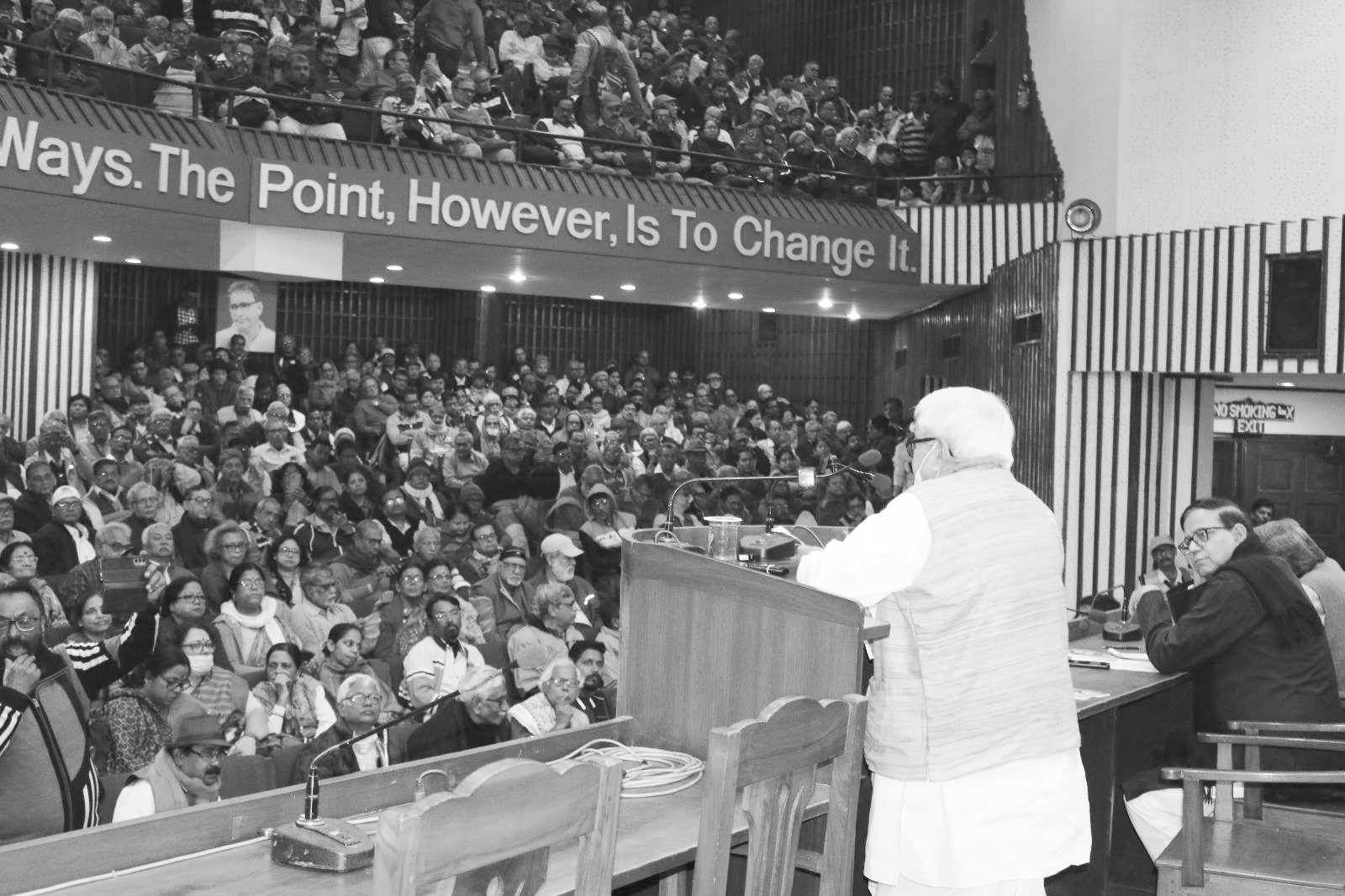
Samprikta Bose
JUST as Modi and his party use anti-Pakistan rhetoric, Mamata Banerjee is attempting to reap political benefits by fomenting anti-Bangladesh sentiment in West Bengal. Addressing the audience on the 59th foundation day of Ganashakti on January 3, CPI(M) West Bengal state secretary Mohammad Salim cautioned against this dangerous trend, stating that Modi had won elections by threatening to "invade" Pakistan. Now, with the 2026 assembly elections in sight, both the Trinamool and the BJP are forgetting Bengal and making posters about Chittagong. They are spreading fear about Bangladesh and causing communal divisions among people here. Their true objective is to divert attention from pressing issues such as the land acquisition bill, job losses, and livelihood concerns.
Speaking at the 59th foundation day of daily Ganashakti ,the mouthpiece of the CPI(M), at Pramod Dasgupta Bhavan in Kolkata, Mohammad Salim and CPI(M) Polit Bureau member Surya Mishra underscored the threats posed by the far-right and the importance of countering divisive narratives. Presiding over the event, Ganashakti Trust chairman and veteran CPI(M) leader Biman Basu called upon well-wishers to strengthen Ganashakti in this fight. Ganashakti editor Samik Lahiri reaffirmed the paper's commitment to presenting an alternative narrative for the working class. CPI(M) Polit Bureau member Ramchandra Dom and other Party leaders were also present. The event was attended by numerous Ganashakti readers and social activists.
Surya Mishra's address focused on the global rise of neo-fascism, emphasizing that unlike a century ago, imperialist powers are now united due to the globalisation of capital. This has led to a surge in the ultra-right and neo-fascism, which thrives on suppressing truth through misinformation and division based on religion, caste, language, and gender. As communists and internationalists, Mishra highlighted the importance of analysing specific situations and taking appropriate action. He clarified that there is no inherent connection between religion and communalism, as communalism is driven by political motives. Quoting Rabindranath Tagore, Mishra called for an organised movement to empower the marginalised.
THREATS OF COMMUNAL POLITICS
Ganashakti Patrika has consistently presented a class perspective and documented mass movements for 59 years. Mohammad Salim acknowledged the challenges faced by the Patrika and pledged to strengthen Party newspapers and media, including Ganashakti, with modern technology. He emphasized the historical role of newspapers in communist movements and contrasted Ganashakti's sales model with that of commercial media. While commercial media serves the interests of the ruling class and manufactures news paid to disseminate misinformation, Ganashakti strengthens mass movements through accurate information.
Salim said that everything necessary for human survival is being looted, Nature is being plundered, and people are being made helpless by spreading xenophobia with the help of the media. The people of Bangladesh had separated religion from the state during the 1971 Liberation War. Now, Jamaat is destroying democracy in the name of religion in Bangladesh, and by showing this, communal hatred is being spread here to destroy democracy. If Bangladesh becomes an Islamic state, it will benefit the Hindutvavadis here in their efforts to turn India into a "Hindu Rashtra."
Therefore, both sides are joining hands to play the politics of hatred. This is how Modi won elections by dragging "Pakistan” into his campaign and this is how the rulers of Pakistan won elections by using”Kashmir question." Elections come and go.Pakistan and Kashmir remain the same, but the plight of the workers, peasants, and unemployed continues to worsen.
He said that with the assembly elections due next year, both the Trinamool and BJP are now focussing on Chittagong. While the leaders of his own party in Malda are killing their own party leaders by hiring contract killers, the Chief Minister is talking about the border issue in administrative meetings instead of evaluating the work of the administration, and her nephew is also ranting about Bangladesh.
Like the BJP, they are also talking about infiltration. They are spreading fear that "the number of minorities is increasing; they will take over the country." Both the ruling parties are trying to suppress people’s demands by creating divisions among people through foreign and regional fears.
Ganashakti's Mission and Vision
In a powerful speech, Editor Samik Lahiri drew parallels between the struggles of Odysseus and the challenges faced by individuals and society today. He argued that we are often trapped by forces that seek to limit our potential, just as Odysseus longed for freedom from Calypso's island. Lahiri emphasized that capitalism and the corporations that control it strive to control our thoughts, information, and ultimately, our freedom.
Lahiri emphasized Ganashakti's unwavering commitment to being the voice of the working class, especially within a media landscape dominated by corporate interests. He expressed gratitude for the readers' financial and moral support, acknowledging their crucial role in sustaining Ganashakti's mission. He stated, "We have consistently stood by the working class, giving voice to their struggles and aspirations. Your contributions have been invaluable in maintaining our mission."
He also mentioned the launch of Ganashakti's online platform and e-paper, further demonstrating their commitment to reaching a wider audience and continuing their mission.
Lahiri concluded his address with a call for a stronger ideological struggle. "We believe that a free and just society is possible, and we will continue to fight for it," he asserted, inspiring the audience to join Ganashakti in its pursuit of a better future.
The event was presided over by Ganashakti Trust chairman and veteran CPI(M) leader Com. Biman Basu. Basu reminded the audience of Ganashakti's rich legacy, reading excerpts from early newspapers to highlight the publication's long history of fighting for social justice and the rights of the working class.
The event also featured musical performances by artists from the Indian People's Theatre Association observing the celebration of 100 years of Musical Maestro Salil Chowdhury.


